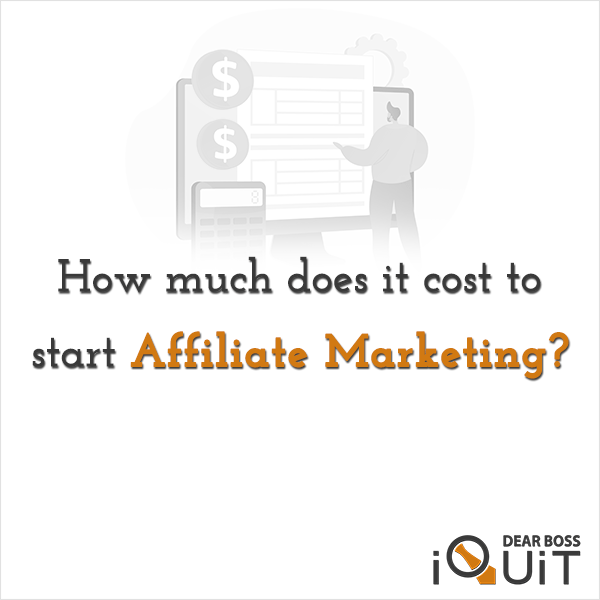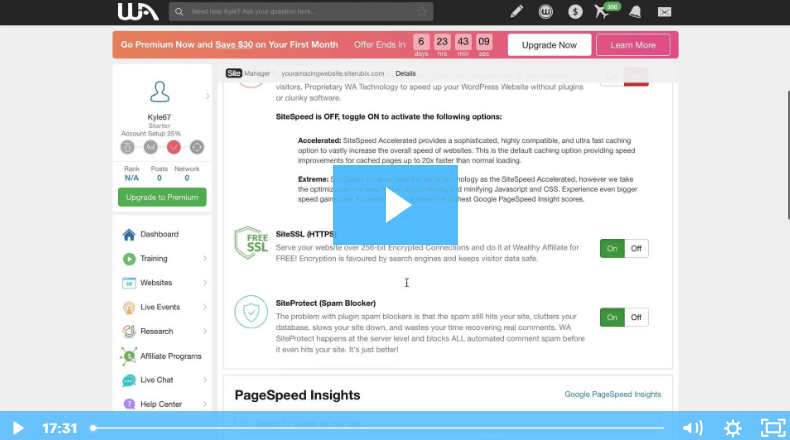“How much does it cost to start affiliate marketing?”
This was actually one of my most burning questions when I was about to embark on my journey to building an income online as an affiliate marketer…
If you’re wondering the same thing, you’re in the perfect place!
This post is geared towards breaking down all the potential expenses of launching and running an affiliate business so that you become fully aware of the exact budget you should be expecting to invest.
Truth is that since affiliate marketing is the process of earning commissions by promoting already existing products, its startup costs are inherently significantly lower than the costs associated with other business models, especially those that involve product creation, maintaining inventory, packaging & shipping, customer service, etc.
In that sense, affiliate marketing can be easily categorized as one of the most affordable business models out there.
Without further ado, let’s start taking a closer look!
Affiliate Marketing Costs (Basic)
The basic costs of starting affiliate marketing could range anywhere between $0 and $350 mostly depending on the type of traffic and the online assets you utilize to get the affiliate offers you promote in front of your target audience.
Nonetheless, it’s worth noting that those numbers are definitely not one-size-fits-all…
Ultimately, the monetary investment you’ll need to make in launching, running, and scaling your own affiliate business is influenced by several factors, such as your financial goals, tools/software you might need to purchase, training courses, the competitiveness of your niche, outsourcing services, and more.
In an attempt to help you gain a better understanding of how much it could cost to get started as an affiliate marketer, I’m going to take you by the hand and guide you through all the costs associated with every step of the process of leveraging affiliate marketing towards building a sizeable income online.
1. Pick a Niche
The first step to starting affiliate marketing is picking a niche…
A niche is basically the market in which you’ll be promoting affiliate products.
Some niche examples include, but are not limited to:
- Weight loss
- Mobile phones
- Patio furniture
- Yoga equipment
- Computer software
- etc
Thankfully, the process of selecting an affiliate niche involves no expenses whatsoever.
2. Build Online Assets
The second step to getting started as an affiliate marketer is building online assets.
An online asset is anything that can be used to connect and interact with your target audience over the internet, such as:
- Blog
- YouTube channel
- Social media page
- Sales funnel
- etc
You can think of your online assets as the “storefront” of your affiliate business where all your affiliate promotions will be taking place.
Some online assets can be utilized completely expense-free while others might involve a small financial commitment…
For example, the costs associated with launching a YouTube channel or a Facebook page are ZERO dollars.
On the other hand, building a sales funnel requires the investment of $50-$200 per month in a decent funnel builder. One of the most popular, simple-to-use, beginner-friendly, and versatile funnel builders is ClickFunnels starting at $97 per month.
Likewise, initiating a blog could set you back $100-$300 per year for hosting and a domain name.
The good news is that you could totally sidestep all the expenses associated with getting a blog up and running by utilizing free blogging platforms like:
- WordPress.com
- Medium.com
- Weebly.com
- and Blogger.com
The platform I personally leveraged towards launching and hosting my first affiliate blog without paying a single dime was Wealthy Affiliate.
The video right below guides you through the process of creating a blog in just 30 seconds completely for FREE inside Wealthy Affiliate.
3. Gather Web Traffic
The third step of utilizing affiliate marketing is gathering web traffic.
Web traffic can be described as the total amount of people who interact with your online assets (e.g. Instagram followers, blog visitors, YouTube viewers, etc) and can be split into the following 2 categories:
- Free Traffic
- & Paid Traffic
Free Traffic
Free traffic refers to traffic generated without spending any money.
The two methods of getting free traffic are:
- Content Marketing
- & Search Engine Optimization (SEO)
Content marketing is the process of creating and publishing content that’s highly relevant to your target audience.
Search Engine Optimization (SEO) is the process of optimizing your blog so that search engines (Google, Yahoo, Yandex, etc) display it at higher positions of their search results.
Neither content marketing nor SEO involves any costs but they both require the investment of immense amounts of upfront work, trial & error, time, and patience until they start producing results.
Ultimately, by utilizing free traffic generation methods, everything you’ll save in money, you’ll have to invest in time and effort.
Paid Traffic
Paid traffic refers to traffic generated via advertising promotions you’ve paid actual money to run.
Paid ads come in a variety of shapes and forms, such as:
- Display Ads
- Paid Search Ads
- Social Media Ads
- Sponsored Content
- Native Ads
Contrary to free traffic, paid traffic:
- starts kicking in instantaneously
- is much less hands-on
- involves less technical work, manpower, and long-term planning
Typically, a budget of $500 should be enough to deploy your first couple of experimental paid ad campaigns…
However, that’s just to get started…
Scaling up an affiliate business using paid traffic will require a much larger financial commitment…
To give you a frame of reference, the average ROI (Return On Investment) of paid ad campaigns is 200%… This means that for every $1 you invest in paid ads, you’ll receive a $2 profit.
As such, to build a monthly profit of $5000 via paid ads, you’ll have to be investing at least $1666 per month in them.
The main downside of using paid ads is that you always run a certain amount of risk of losing money as there’s no guarantee whatsoever that the traffic you pay for will generate any actual sales.
4. Promote Affiliate Offers
The fourth step to making money with affiliate marketing is monetizing the traffic that interacts with your online asset(s) by promoting niche-relevant affiliate offers.
To do that, you’ll need to sign up for affiliate programs operated by merchants who sell products/services that could help your audience achieve their goals, solve their problems, and overcome their challenges.
Thankfully, 99.9% of affiliate programs out there are completely free to join.
Affiliate Marketing Costs (Optional)
On top of the basic costs of getting started with affiliate marketing outlined right above, you might end up having additional optional expenses usually associated with purchasing resources that could help you smoothen, speed up, and boost the progress of your affiliate business, such as:
- Training
- Tools
- & Outsourcing
Let’s take a closer look…
1. Training
Spending money on training isn’t really a prerequisite for getting started as an affiliate marketer…
However, having the right guidance could shorten your learning curve, minimize trial and error, save you immense amounts of frustration and disappointment, speed up your progress, and significantly increase the chances of taking your affiliate business to success!
Nowadays, getting your hands on high-quality affiliate education could set you back anywhere between $50 (monthly) and $997 (one-off).
Here’s a roundup of The Best Affiliate Marketing Courses I’ve personally come across that have a proven track record of delivering results!
2. Tools
Just like building a house, launching a successful affiliate business requires a specific set of tools…
Some of the most common tools purchased by affiliate marketers include, but are not limited to:
- Keyword Research Tool: $50 – $100 per month
- Affiliate Tracking Software: $50 – $250 per month
- Competitive Analysis Platforms: $50 – $100 per month
- Email Marketing Automation: $0 – $200 per month
- SEO Auditors: $20 – $100 per month
- Images & Creatives: $20 – $40 per month
3. Outsourcing
Most aspiring affiliate marketers start as a one-man operation…
However, as your business starts gaining traction and your duties and responsibilities increase exponentially, chances are that handling everything all by yourself will eventually become nearly impossible.
At this point, you’ll have no choice but to start outsourcing some of your daily tasks to freelancers.
Thankfully, there’s no shortage of freelancers with expertise in all kinds of fields like:
- website design
- editing content
- writing emails
- content production
- virtual assistance
- social media management
- etc
Three of the most commonly used platforms for browsing through and hiring freelancers are:
- Fiverr.com
- Upwork.com
- & Freelancer.com
The vast majority of decent freelancers charge at least $10/hour.
If you go for cheaper, chances are that the quality of the work you’ll be receiving will be below average.
Conclusion
Here’s a recap of all the potential expenses of starting, operating, and growing an affiliate marketing business…
Basic:
- Domain Name: $10 per year
- Hosting: $100 – $300 per year
- Funnel Builder: $50 – $200 per month
- Paid Traffic: $500 (Initial Budget)
Optional:
- Training: $50 per month – $997 one-off fee
- Tools:
- Keyword Research Tool: $50 – $100 per month
- Affiliate Tracking Software: $50 – $250 per month
- Competitive Analysis Platforms: $50 – $100 per month
- Email Marketing Automation: $0 – $200 per month
- SEO Auditors: $20 – $100 per month
- Images & Creatives: $20 – $40 per month
- Outsourcing: $10 – $20 per hour
Ultimately, the amount of money you’ll have to invest in starting affiliate marketing will depend mostly on the type of traffic and the online assets you leverage towards bringing the affiliate offers you promote in front of your target audience.
For instance, if you become a YouTuber you won’t need to spend money on any resource that might otherwise be essential to running paid ad campaigns, such as a domain name, hosting, a funnel builder, and affiliate tracking software.
Whichever path you choose to follow, I strongly suggest signing up for some solid education…
Having access to expert guidance will take away immense amounts of guesswork, shorten your learning curve, minimize trial and error, and significantly increase the chances and speed of achieving your financial goals.
That being said, here’s a roundup of The Best Affiliate Marketing Courses that have helped thousands of aspiring affiliate marketers build successful affiliate businesses from scratch.
Have any questions?
Leave a comment right below or contact me right here.
I’ll be more than happy to help you out!
All the best,
Harry Niotis, Founder & Editor at dearboss-iquit.com




